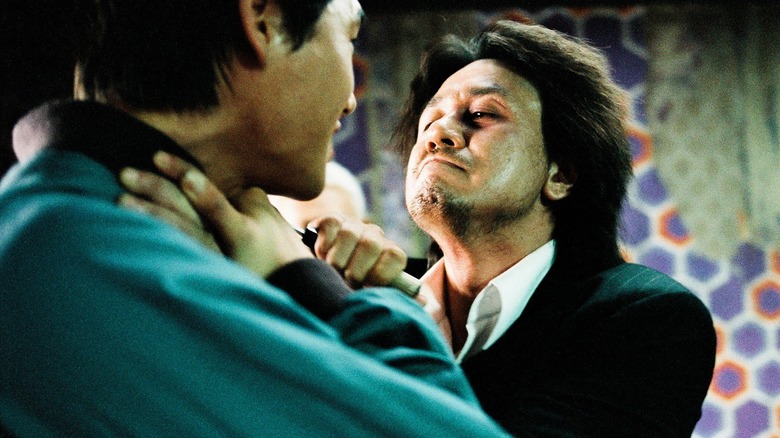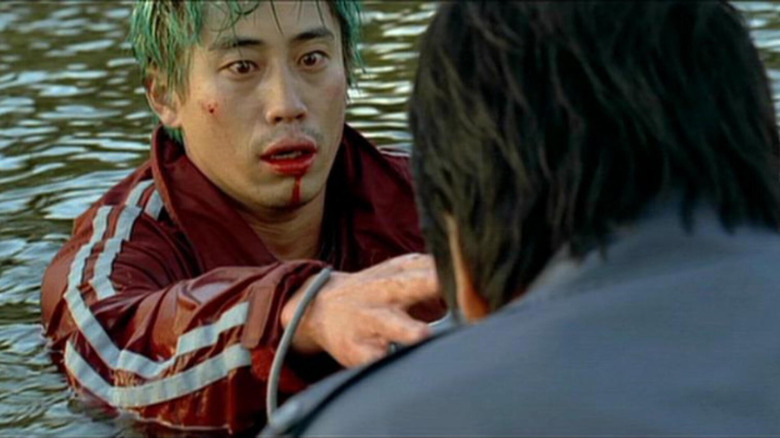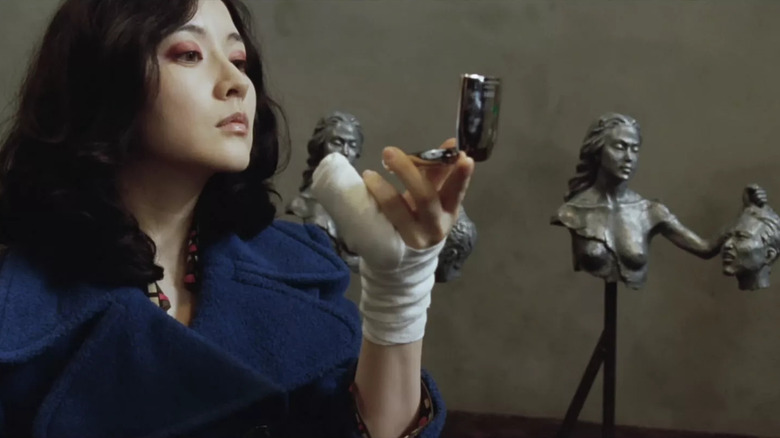There's A Reason So Many Park Chan-Wook Movies Are About Revenge
2002's "Sympathy for Mr. Vengeance" was Park Chan-wook's fourth film as a director, but it established a motif. "Mr. Vengeance" is about a man named Ryu (Shin Ha-kyun) who donates a kidney to a black market organ harvester in exchange for a matching kidney intended for his ailing sister. When he gets ripped off and can no longer afford the operation, he watches her die. When he takes her to the river to bury her, his daughter slips and drowns. It's understandable why he would want to take vengeance.
In 2003's "Oldboy," a man named Oh Dae-su (Choi Min-sik) is kidnapped and thrown into a locked motel room. He is held with no communication or explanation for 15 years, only able to watch TV to catch up with the world. Then, just as randomly as he was kidnapped, he is released with the instruction to find who locked him up. Dae-su delves heartily into the underworld trying to find his captor. He commits horrid acts that crescendo to a tragic climax worthy of Shakespeare. It's understandable why he would want to take vengeance.
In 2005's "Lady Vengeance," a woman named Lee Geum-ja (Lee Young-ae) has been released from prison after a 13-year murder sentence. During her sentence, she became a media personality, though fame was a carefully cultivated tool for revenge. Years ago, she was blackmailed into aiding a horrible man (Choi) in a kidnapping ring, accidentally abetted the murder of a child, and took the blame to protect her newborn infant. In planning her post-prison life, she discovers others who have just as solid a claim to her intended victim's blood. It's understandable why she would want to take vengeance.
The three films make up Park's Vengeance Trilogy. All were widely celebrated upon their release (mostly "Oldboy," which won the Grand Prix at Cannes). Each is a dark fable of punishment, people getting what they deserve, and, most strikingly, people suffering for no good reason.
Why was Park Chan-wook driven to make such movies? In a 2016 interview with the A.V. Club, Park explained. Revenge, it seems, is meaningless.
Vengeance is meaningless
Blood revenge is, of course, a common motivation in film. Violent revenge stories are popular, as they provide the audience a catharsis they wouldn't be able to achieve in real life. Wronged? Kill a guy. Easy-peasy. Given how often Park Chan-wook revisited the concept, one might sense a preoccupation. The A.V. Club asked Park how much he personally believes in revenge and why he made three bleak and violent films on the subject. Park explained he intended it as a narrative device:
"It's a device which dares to make us think what it is to be a human. And to think about this human existence, that vengeance is meaningless. Even a small child, if they think about it, they will understand this. Revenge is about something that has already happened, and when you are trying to achieve vengeance, you are investing your everything into a venture that will lead you to no benefit at the end. It is a human trait, to engage in foolish acts. And to observe this foolish act and reflect on it is the intention of those narratives."
This is true of most revenge-based thrillers, and certainly of Park's Vengeance trilogy. Characters are harmed or aggrieved, all at the hands of another, but their revenge ultimately proves to be futile. Park points out that revenge stories are inherently manipulative because they elicit sympathy for an act that will ultimately be bloody and unrewarding.
"When they [the audience] see a vengeance drama, they see the protagonist has lost something. This makes them sympathize with the protagonist and angers them. And they go on this journey with the protagonist, and on this journey, they root for the protagonist. Never once do they ask the question about how fruitless or meaningless this act of vengeance is. Or rather, [they don't ask] why the protagonist doesn't just concentrate on his life here and now, and try to think about living the rest of his life in a more fulfilling way rather than engage in a fruitless endeavor. This thought doesn't come across [to] the audience."
Reflection after the fact.
One could argue that all action films are intended to offer a similar manipulation. Action movies provide images of pursuit, fights, and destruction as dramatic solutions to simple problems. It's perhaps telling that the most successful movie series in the world right now is based on the actions of a group calling themselves avengers. The audience is being, essentially, morally tricked into believing that fight-based answers are okay. Park feels that is the nature of a good revenge story. He continued to the A.V. Club:
"So they only pursue this foolish desire, and it's only at the end of the film, as they come out the theater, [that they] reflect on what they've seen and realize how foolish the business of vengeance is. Good vengeance drama should always make the audience think this way."
Park seems to feel that humanity has violent impulses, but to face its darker aspects, we must be tricked into rooting for them first. The audience, after all, is sometime complicit in the on-screen violence they witness. Park may not personally believe in vengeance, but he is carrying an ethos with him. The AV Club asked about how often he explicitly brings his personal beliefs into a film. Park responded:
"Well, it's different from film to film, different from scene to scene. And these films are not just about personal statements. But 'The Handmaiden' for sure is where my personal statement is very exposed in a strong way. What surprises me is that often people will confuse the thoughts of characters in the film as the thoughts of the film director. And that is something the audience should carefully avoid."
Park taps into something that has been brought up a lot in contemporary criticism: the notion of depiction vs. endorsement. The films of Park's Vengeance Trilogy are about blood revenge, but in being bleak tragedies, they clearly don't advocate for blood revenge. They're merely a bloody, sad, amazing time at the movies.


